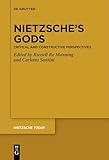Nietzsche's Gods : Critical and Constructive Perspectives / ed. by Russell Re Manning, Carlotta Santini.
Material type: TextSeries: Nietzsche Today ; 6Publisher: Berlin ; Boston : De Gruyter, [2022]Copyright date: ©2023Description: 1 online resource (VIII, 302 p.)Content type:
TextSeries: Nietzsche Today ; 6Publisher: Berlin ; Boston : De Gruyter, [2022]Copyright date: ©2023Description: 1 online resource (VIII, 302 p.)Content type: - 9783110610260
- 9783110610413
- 9783110612172
- 193
- online - DeGruyter
- Issued also in print.
| Item type | Current library | Call number | URL | Status | Notes | Barcode | |
|---|---|---|---|---|---|---|---|
 eBook
eBook
|
Biblioteca "Angelicum" Pont. Univ. S.Tommaso d'Aquino Nuvola online | online - DeGruyter (Browse shelf(Opens below)) | Online access | Not for loan (Accesso limitato) | Accesso per gli utenti autorizzati / Access for authorized users | (dgr)9783110612172 |
Browsing Biblioteca "Angelicum" Pont. Univ. S.Tommaso d'Aquino shelves, Shelving location: Nuvola online Close shelf browser (Hides shelf browser)
Frontmatter -- Foreword -- Table of Contents -- Introduction -- Part I: Nietzscheʼs Greek Gods -- Nietzsche’s Apollo -- The Return of the Epicurean Gods -- Friedrich Nietzsche on the Greek Mysteries -- Part II: Nietzscheʼs Christianity -- The Apostle Paul’s Conception of Sárx and Nietzsche’s Feeling of Power -- Conversion and Convalescence: Matters of Grace -- Life-Affirmation and Disgust with Humanity in the Wake of the Death of God -- The Concept of ‘Antichrist’: Twilight or Renewal of Atheism -- Part III: Nietzscheʼs Theologies -- Nietzsche’s (Experimental) Perspectival Poly-Pantheisms -- Intoxication, Ecstasy, Death: Nietzsche on “Divine” States -- Religion in the Light of Good Conscience -- Part IV: Nietzscheʼs Future Gods -- The Greatest Advantage of Polytheism: Monotheism and Normalization through Truth -- The Moderate Man and the Weak God: Nietzsche, Vattimo and Nihilism Today -- Bataille’s Word: ‘Dieu soit mort’ (God be Dead) -- The Corpse in the Machine: Outlining a Genealogical Approach to the Technological Revolution -- Index of Persons and Subjects
restricted access online access with authorization star
http://purl.org/coar/access_right/c_16ec
The place (or absence) of God in Nietzsche’s thought remains central and controversial. Nietzsche’s proclamation of 'the death of God' is one of the most famous (and parodied) slogans in modern philosophy, seeming to encapsulate the nineteenth-century loss of religious faith in the affirmation that God has "turned out to be our oldest lie" and yet the nature of Nietzsche’s own ‘theology’ is far from clear. This volume engages with Nietzsche’s arguments about God, theology, and religion. The volume extends the discussion to an engagement of Nietzsche with alternative models of God, with ancient Greek religions, and with discussions of diversity (race, class, gender, sex) in dis/conjunction with religion. The chapters examine Nietzsche’s genealogy of religion and his claims about the place of God and theology in the history of Western thought ("that faith of the Christians, which was also Plato’s faith"), as well as his engagements with alternative conceptions of God. The volume also examines the historical and contemporary reception of Nietzsche’s arguments about God by religious and non-religious thinkers, asking to what extent Nietzsche’s philosophy of God speaks to the challenges of today's globalized philosophy and religion.
Issued also in print.
Mode of access: Internet via World Wide Web.
In English.
Description based on online resource; title from PDF title page (publisher's Web site, viewed 29. Mai 2023)









